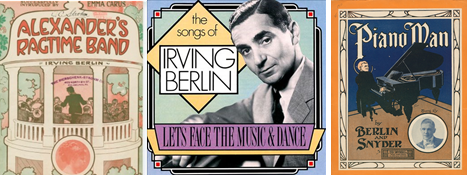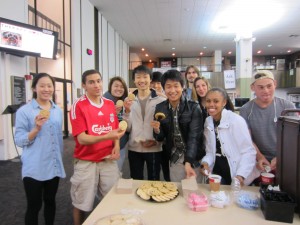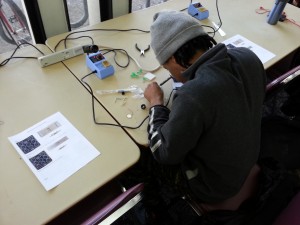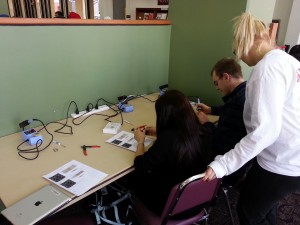Boyer Noontime Concert Series at Paley Library
 John Johnson, pianist, singer, scholar, and entertainer extraordinaire performs songs of Irving Berlin in the continuation of his enormously popular Great American Songwriters Series. John Johnson, pianist, singer, scholar, and entertainer extraordinaire performs songs of Irving Berlin in the continuation of his enormously popular Great American Songwriters Series.
|
Thursday,
December 4th
12 – 1 P.M.
Paley Library Lecture Hall
Light Refreshments Served.
Bring your lunch.
Bring your friends.
Boyer recital credit given.
Relax. Refresh.Renew.
Enjoy!
|
 Irving Berlin Irving Berlin, beloved composer of a huge repertoire of American classics such as Play a Simple Melody, I Love a Piano, Cheek to Cheek, Top Hat, White Christmas, and more! |

“Music is so important. It changes thinking, it influences everybody, whether they know it or not.” –Irving Berlin, 1920, in an interview for American Magazine.
Irving Berlin, born Israel Isidore Baline in Tyumen (Siberia), Russia, 1888, died September 22, 1989, New York City. When he was four years old, his family fled Russia to escape a pogrom and traveled to the United States where they lived in New York City. There, Berlin attended public school until the age of 13 when his father died. The young Berlin then went to work to help support the family, playing and plugging songs on Broadway and performing vaudeville. He published his first song ‘Marie from Sunny Italy’ in 1907. In 1911 Berlin published his first big hit ‘Alexander’s Ragtime Band.’ His career of over 40 years spanned decades of American popular culture, and his songs reflect changes in that culture. As a result, Berlin’s musical style encompasses a range of styles from vaudeville to Tin Pan Alley, ragtime, sentimental ballads, and patriotic songs.
An extremely prolific composer, Irving Berlin wrote over 1,500 songs, 19 Broadway shows, and wrote scores for 18 Hollywood films. He was nominated for eight Academy Awards, and in 1942 won the award for best song ‘White Christmas‘. Other awards include multiple Tony Awards, the Grammy Lifetime Achievement Award, Songwriters’ Hall of Fame, the Presidential Medal of Freedom, and a star on the Hollywood Walk of Fame.
Selected Broadway Shows and Songs
Watch Your Step (1914) – ‘Play a Simple Melody’
Stop! Look! Listen (1915) – ‘The Girl on the Magazine Cover,’ ‘I Love a Piano’
Yip! Yip! Yaphank (1918) – ‘Oh, How I Hate to Get Up in the Morning’
Ziegfeld Follies (1919) – ‘A Pretty Girl is Like a Melody,’ ‘Mandy’
Music Box Review (1921-1924) – ‘Say It With Music,’ ‘Lady of the Evening’
As Thousands Cheer (1933) – ‘Heat Wave,’ ‘Easter Parade,’ ‘Supper Time’
Annie Get Your Gun (1946) – ‘Doin’ What Come Natur’lly’, ‘The Girl That I Marry,’ ‘Anything You Can Do,’ and more.
Selected Songs for Films
Mammy (1929) – ‘Let Me Sing and I’m Happy’
Top Hat (1935) – ‘Cheek to Cheek,’ ‘Top Hat, White Tie and Tails’
Follow the Fleet (1936) – ‘Let’s Face the Music and Dance’
Holiday Inn (1942) – ‘Happy Holidays,’ ‘White Christmas’
Easter Parade (1948) – ‘Better Luck Next Time,’ ‘Steppin’ Out with My Baby’
White Christmas (1954) – ‘Count your Blessings,’ ‘The Best Things Happen When You’re Dancing’
Selected Songs
Alexander’s Ragtime Band (1911)
All By Myself (1921)
All Alone (1924)
Always (1925)
Remember (1925)
Blue Skies (1927)
Puttin’ On the Ritz (1929)
How Deep is the Ocean (1932)
Say It Isn’t So (1932)
God Bless America (1939)
More Information
Bergreen, Laurence. As Thousands Cheer: the Life of Irving Berlin. New York: Viking, 1990. Paley Library ML410.B499B5 1990
“Berlin, Irving.” Encyclopedia of Popular Music, 4th ed. Ed. Colin Larkin. Oxford Music Online. Oxford University Press. Web. 3 Dec. 2014.<http://www.oxfordmusiconline.com/subscriber/article/epm/2064>.
Bordman, Gerald, and Thomas S. Hischak. “Berlin, Irving.” Grove Music Online. Oxford Music Online.Oxford University Press. Web. 3 Dec. 2014. (Temple authentication required.)
Furia, Philip and Graham Wood. Irving Berlin: a Life in Song. New York: Schirmer Books, 1998. Paley Library ML410.B499F87 1998
“Irving Berlin.” Contemporary Musicians. Vol. 8. Detroit: Gale, 1992. Biography in Context. Web. 3 Dec. 2014. (Temple authentication required.)
Jablonski, Edward. Irving Berlin: American Troubadour. New York: Holt, 1999. Paley Library ML410.B499J33 1999
Sears, Benjamin. The Irving Berlin Reader. New York: Oxford U. Press, 2012. Paley Library ML410.B499 I78 2012
Listen to Music by Irving Berlin!
Berlin, Irving. Composers On Broadway: Irving Berlin. Cond. Stanley Black, Hal Mooney, John Mauceri, and Milton Rosenstock. Perf. Various Artists. Rec. 20 June 2006. Decca Records, 2006. Music Online: Classical Music Library. Web. 3 Dec. 2014. (Temple authentication required.)
Fitzgerald, Ella, Ted Nash, Chuck Gentry, John Best, Pete Candoli, Harry “Sweets” Edison, Don Fagerquist, William Schaefer, Juan Vincente Martinez Tizol, Julian Clifton “Matty” Matlock, Gene Cipriano, Paul Smith, Barney Kessel, Joe Mondragon, and Alvin Stoller, perfs. The Irving Berlin Songbook. Rec. 10 Apr. 1992. Universal Classics & Jazz, 1992. Music Online: Jazz Music Library. Web. 3 Dec. 2014. (Temple authentication required.)
Irving Berlin At The Movies Volume 1. Rec. 30 Nov. 2008. Vanilla OMP, 2008. Music Online: Popular Music Library. Web. 3 Dec. 2014. (Temple authentication required.)
Irving Berlin At The Movies Volume 2. Rec. 30 Nov. 2008. Vanilla OMP, 2008. Music Online: Popular Music Library. Web. 3 Dec. 2014. (Temple authentication required.)






